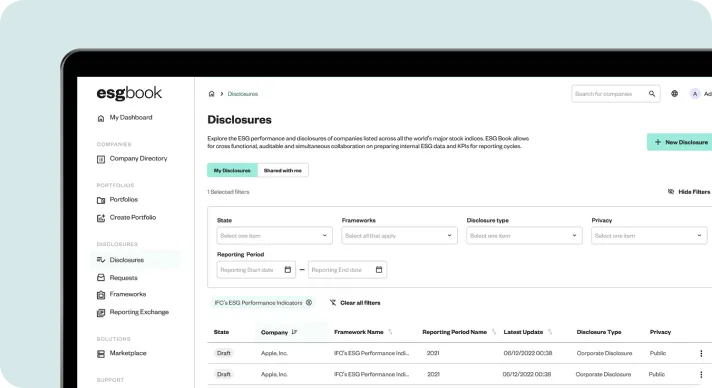Policy Digest: October 2025

This month’s digest highlights key regulatory and policy shifts shaping corporate sustainability disclosure across major markets:
United States
- California: Over 4,000 companies—including most S&P 500 firms—will fall under new state climate disclosure laws, driving significant compliance planning.
- Federal level: Regulators move to scale back Biden-era emissions reporting for oil & gas, citing cost concerns—intensifying the federal vs. state policy divide.
- Takeaway: Expect continued patchwork compliance pressure across U.S. jurisdictions; state-led rules will drive near-term reporting action.
Europe
- CSRD & CSDDD revisions: EU lawmakers propose narrower scopes—CSRD to cover companies with >1,000 employees or €450m revenue; CSDDD limited to firms with >5,000 employees or €1.5bn revenue.
- Delay for non-EU entities: Implementation timeline for third-country companies pushed back. Takeaway: Reduced exposure for mid-sized firms, but stricter standards for large multinationals remain on track—clarity for resource allocation and compliance planning.
Asia-Pacific
- Australia: AASB and regulators introduce detailed IFRS-aligned guidance on GHG disclosures, assurance, and energy sector reporting.• New Zealand: FMA proposes exemptions for foreign filers and extensions for Scope 3 reporting; new guidance targets greenwashing in retail investment products.
- Hong Kong & Singapore: Updated sustainability taxonomies and anti-greenwashing frameworks enhance regional credibility and investor trust.
- Takeaway: Accelerating regional convergence around IFRS-based standards—businesse should align early to capture investor confidence and regulatory readiness.
Africa
- Rwanda & Uganda: National green taxonomies under development to steer investment toward sustainable and climate-resilient sectors.
- Takeaway: Growing ESG infrastructure opens new sustainable finance and impact investment opportunities across emerging African markets.
Global Outlook
- Regulators worldwide continue to move toward standardized, enforceable sustainability disclosure.
- Companies that align early with evolving frameworks will gain competitive advantage through transparency, investor trust, and reduced regulatory risk.

EU Delays CSRD Reporting Standards for Non-EU Companies as Lawmakers Agree on Major Cuts to Sustainability Rules
The European Commission has announced a delay in adopting the European Sustainability Reporting Standards (ESRS) for non-EU companies under the Corporate Sustainability Reporting Directive (CSRD), as part of its broader “simplification agenda” aimed at reducing regulatory burden and enhancing competitiveness. The ESRS for third-country undertakings—initially scheduled for mid-2024 and later postponed to 2026—has now been deprioritized, with adoption unlikely before October 2027. The delay also affects standards for listed SMEs and sector-specific ESRS.
The move coincides with progress on the EU’s Omnibus I initiative, a sweeping reform package revising key sustainability regulations including the CSRD and the Corporate Sustainability Due Diligence Directive (CSDDD). European Parliament lawmakers have reached a compromise position that substantially narrows the scope of both regulations. Under the new proposal, CSRD reporting would apply only to companies with more than 1,000 employees or €450 million in revenue, while the CSDDD would be limited to companies with 5,000 employees and €1.5 billion in revenue, shifting to a risk-based due diligence approach focused on direct business partners.
These developments mark a significant scaling back of the EU’s sustainability framework, reflecting political momentum toward regulatory streamlining and international alignment—particularly amid U.S. concerns that the CSRD could impose undue burdens on American firms. Read more

California Air Resources Board releases list of over 4000 companies covered under state climate disclosure laws
The California Air Resources Board (CARB) has identified 4,160 U.S. companies operating in California that fall under the state’s Corporate Climate Reporting Rules. Under SB 253, companies with annual revenues exceeding USD 1 billion and conducting business in California must disclose their Scope 1, 2, and 3 emissions annually, beginning in 2026. Complementing this, SB 261 requires companies with revenues above USD 500 million to report on climate-related financial risks. According to CARB’s preliminary list, more than 2,500 companies will be subject to emissions disclosure under SB 253, while over 1,500 companies will be required to comply with SB 261. Although the list is provisional, it highlights the significant reach of California’s state-level climate policy—encompassing a majority of S&P 500 companies. CARB has additionally clarified some entities may be exempt from reporting if their parent companies provide consolidated disclosures, thereby covering their subsidiaries under group-level reporting. Learn more by reviewing the FAQs and Draft checklist.
EPA proposes roll back of GHG emissions reporting for carbon-intensive industries
The Environmental Protection Agency (EPA) has proposed rolling back certain reporting obligations for carbon-intensive industries, including large oil and gas facilities. Currently, the Greenhouse Gas Reporting Program (GHGRP) requires 47 source categories, covering more than 8,000 U.S. facilities and suppliers, to disclose their greenhouse gas emissions annually. The EPA cited the program as “burdensome” in terms of regulatory costs but emphasized that its statutory responsibilities under the Clean Air Act would remain unaffected if the rule were overturned, as the data collection itself is not deemed essential to fulfilling those obligations. The proposal aligns with the “America First” and “Energy Dominance” policy priorities advanced under the Trump administration. Read more

Australia releases guidance for GHG emissions reporting under AASB S2 Climate-related Disclosures
The Australian Accounting Standards Board (AASB) has released a new resource clarifying key aspects of greenhouse gas (GHG) reporting. It emphasizes that the GHG Protocol is an investor-focused disclosure standard designed to support climate transition reporting, whereas the National Greenhouse and Energy Reporting (NGER) scheme functions as a compliance-based framework. For reporting purposes, entities not covered by the NGER scheme must apply the GHG Protocol to report their emissions. Based on feedback from auditors, the AASB now requires that biogenic emissions be included within the main Scope categories. The guidance also elaborates on critical concepts such as “operational control” under the GHG Protocol—defined as the authority to implement operating policies, rather than merely setting site-level rules. Finally, it clarifies that materiality applies to both quantitative and qualitative disclosures under AASB 2, ensuring that all relevant information is considered from the user’s perspective. Read more
ASIC FAQs: Review or audit of sustainability reports
The Australian Securities and Investments Commission (ASIC) has issued FAQs addressing the review and auditing requirements for sustainability disclosures under the Corporations Act 2001. The guidance clarifies how auditors should form an opinion on sustainability reports, what the auditor’s report or opinion must include, and the extent to which modified liability settings apply to statements made in the auditor’s report. For reporting entities, the FAQs outline the process for obtaining a review or audit of sustainability reports, including the appointment, removal, or resignation of auditors, and who is qualified to conduct such reviews or audits. ASIC has emphasized that it will adopt a proportionate and phased approach to oversight, supervision, and enforcement of sustainability report auditing requirements under the Corporations Act, focusing enforcement actions only on cases involving serious breaches or misconduct. Read more
Australian Energy Council releases guide for energy companies reporting under AASB 2
The guide supports Australian energy companies in making accurate, transparent, and comparable greenhouse gas disclosures in line with AASB S2, which requires measurement under the GHG Protocol unless a jurisdiction mandates otherwise. It provides principles for applying consistent and credible reporting approaches—covering accuracy, transparency, materiality, comparability, and methodological discretion—to ensure integrity and stakeholder confidence in the sector’s transition to net zero. Read more
New Zealand top financial regulator proposes climate reporting relief for foreign-incorporated entities
The NZ Financial Markets Authority (FMA) has proposed a class exemption for foreign-incorporated entities from New Zealand’s climate reporting obligations under the Financial Markets Conduct (FMC) Act. The exemption would recognize equivalence with home-country reporting regimes, provided those reports are broadly consistent with New Zealand’s requirements. The proposal aims to reduce duplication and compliance costs for foreign firms operating in New Zealand—while maintaining high-quality, consistent, and comparable sustainability disclosures for investors. The consultation is open until 24th October 2025. Read More
New Zealand Financial Markets Authority launches consultation on ethical investing disclosure
The FMA has opened a consultation on updated guidance for ethical and sustainability claims by financial product providers. The principles-based guidance emphasizes clarity, consistency, and substantiation across all product communications, including marketing and visuals. It also provides practical examples of greenwashing, guidance on the use of third-party data, and reinforces advisers’ duty to act in clients’ best interests on ethical investments. Read more
New Zealand External Reporting Board (XRB) proposes amendments to Climate and Assurance standards
The XRB has proposed extending adoption provisions related to Scope 3 emissions reporting and assurance. The proposal includes two additional reporting periods for Scope 3 disclosures and extends assurance requirements by the same duration. Associated provisions—such as those for comparative information and trend analysis—would also be extended, insofar as they relate to Scope 3 emissions. To implement these changes, the XRB is proposing amendments to:
- NZ CS 2: Adoption of Aotearoa New Zealand Climate Standards
- NZ SAE 1: Assurance Engagements over Greenhouse Gas Emissions Disclosures
The XRB expects to finalize the amendments by October 2025. Read more
Shanghai Stock Exchange launches consultation on sustainability reporting guidelines for listed companies
The Shanghai Stock Exchange (SSE) has issued three new guides on pollutant emissions, energy use, and water use reporting. The guidance is built around four principles:
- Strengthening sustainability risk management and integration into corporate governance;
- Clarifying key disclosure items with enhanced guidance on environmental topics;
- Providing sample disclosures to address methodological and data quality gaps; and
- Aligning with existing reporting scopes.
The guides aim to support listed companies in preparing sustainability reports without increasing disclosure burdens. Read more
Hong Kong Monetary Authority launches Phase 2A of Green Taxonomy
The Hong Kong Monetary Authority (HKMA) has expanded its Green Taxonomy to include transition activities, reflecting a more nuanced approach aimed at driving the “decarbonization of the real economy”. This phase of development introduces sector-specific transition pathways for high climate-impact industries, with time-bound decarbonization targets aligned to a 1.5°C scenario and the goal of net zero by 2050. For example, the energy sector is assigned a phase-out timeline to 2035 to account for evolving emissions-reduction technologies. The proposed updates broaden the Taxonomy’s scope beyond climate change mitigation to include adaptation, recognizing the growing importance of physical risks such as natural disasters and extreme weather events. Phase 2 of the Hong Kong Taxonomy currently covers 12 economic activities across four sectors — power generation, transportation, construction, and water and waste management. Future iterations are expected to extend coverage to additional sectors, including Carbon Capture, Utilization and Storage (CCUS), reinforcing the Taxonomy’s overarching goal of mobilizing investment toward a low-carbon future. Read more
Singapore releases anti-greenwashing guidelines
Singapore’s Ministry of Trade and Industry, through the Competition and Consumer Commission of Singapore (CCS), has issued guidelines to address misleading environmental and quality claims in product and service marketing as part of efforts to combat greenwashing. A 2022 CCS study found that over half of online product claims were overly technical, obscuring real benefits and making substantiation difficult. The study also revealed that terms such as “eco-friendly,” “sustainable,” and “green” were often vague, exaggerated, or misused relative to actual environmental performance. The new guidelines adopt a principles-based approach, urging businesses to use clear, accurate, and meaningful terminology in sustainability-related claims and to ensure that all material product attributes are both easily understood by consumers and properly verified. Read more

Rwanda launches Green Taxonomy
Rwanda’s Green Taxonomy serves as a framework to facilitate meaningful sustainable investment through standardized criteria and to help prevent greenwashing. The first phase focuses on key economic sectors—agriculture, construction, transport, and energy—that play a significant role in achieving climate change mitigation and adaptation objectives. The sustainable taxonomy can be applied as a reference framework for disclosure regulations, a standard for green bond issuance, a tool for fulfilling Nationally Determined Contributions (NDCs), and a mechanism for assessing and managing environmental risks. It is a key sustainable finance instrument intended for use by a wide range of stakeholders, including banks, investors, regulators, and green bond issuers. Read more
Ugandan Government launches National Green Taxonomy 2025
On 11th September, Uganda launched its National Green Taxonomy 2025 to mobilize investment in climate-resilient projects and facilitate cross-border green finance flows. The taxonomy enhances transparency and standardization in disclosures, helps prevent greenwashing, and supports monitoring of private sector contributions toward Uganda’s climate commitments. It defines activities and eligibility criteria across key sectors—agriculture, energy, transport, construction, water and sanitation, waste management, and forestry—based on their environmental impact. The framework covers six environmental objectives: climate change mitigation and adaptation, sustainable use of water and marine resources, circular economy transition, pollution prevention, and biodiversity protection and restoration. Read more

- UNPRI publishes Sustainability in supply chains: A guide for private markets investors. Read More
- Securities Commission Malaysia publishes sector-specific illustrative sustainability reports based on the IFRS Standards. Read More
- UNSEE publishes Model Guidance on Nature-related Financial Disclosures. Read More
- WBCSD introduces Practical Guide on Transition Plan Dependencies. Read More
- UNEP FI launches Guidance for Climate Target Setting for Banks - Version 4. Read More
- New report: Integrating Nature-related Aspects in Business Responsibility & Sustainability Reporting (BRSR) Disclosures using the Taskforce on Nature-related Financial Disclosures (TNFD) Recommendations. Read More
- ISO launches new biodiversity standard. Read more



